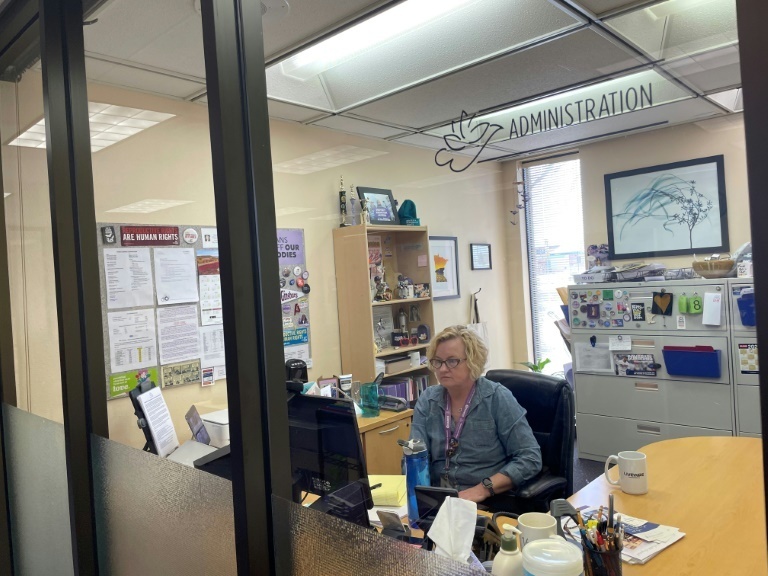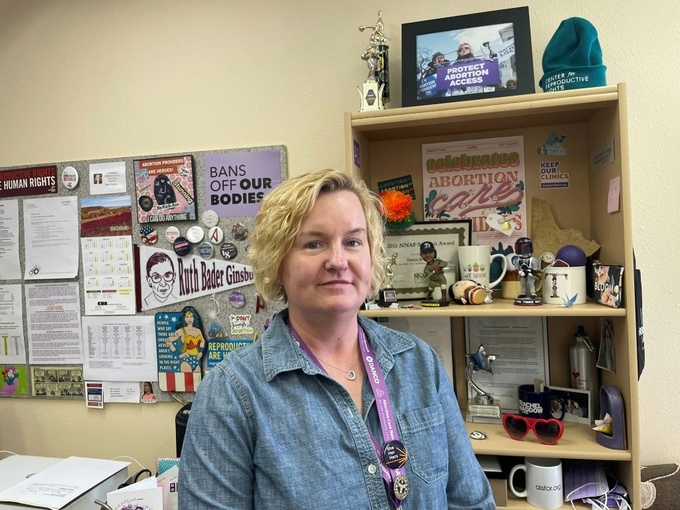As a first-year college student from the Minneapolis suburbs, Tammi Kromenaker was proudly anti-abortion, at one point slapping a "God is pro-life" bumper sticker on her dormitory room wall.
Currently serving as the head of an abortion clinic, she laughs about it all now. But in many ways, her relationship with abortion continues to be a winding odyssey -- more literally these days, after the fall of Roe v. Wade last year forced her to up and move the clinic.
Kromenaker, 51, once ran the last abortion clinic in North Dakota, before moving her facilities next door to Minnesota, her more progressive home state.
Her journey is just one of many lives upended after the US Supreme Court struck down the federal right to abortion a year ago this month, sending both doctors and patients scrambling across borders as states imposed their own restrictions -- or protections.
She might have been an activist for almost 25 years, but the past few months have felt like a "roller coaster," she told AFP from the Red River Women's Clinic office in Moorhead, Minnesota, a stone's throw from the North Dakota state line.
Fears began mounting in the abortion-rights camp in May 2022, when the conservative-leaning Supreme Court's impending decision leaked to the media. Kromenaker, sensing an imminent shift, had already started thinking about relocating her clinic.
The official decision on June 24, 2022 threw abortion regulation back to the states -- and sent Kromenaker across the river that divides North Dakota and Minnesota. She had signed the papers for the new building the day before.
The move was made in several stages, with the utmost discretion to avoid drawing attention from anti-abortion activists. After all, her friend Julie Burkhart's clinic in Wyoming had been burned down.
Even in her new neighborhood she sometimes wore a hat and sunglasses during the move, attempting to remain "covert" and unidentified.
That's not to say she was completely alone: she had the help of her husband, friends and community members, while an online fundraising campaign to help finance the move raked in $1 million, greatly exceeding the original $20,000 goal.
Then, the day after the move, Kromenaker's father died -- another "whirlwind" in what was already a series of stressful months, she recalled.
- Beliefs 'flipped' -

At a young age, after a personal tragedy, she started dating a boy "addicted to skateboarding and punk music." But then his addiction switched to Jesus, and in a "very evangelical" way.
"We would go to these Christian music festivals, and I just thought it was fun," Kromenaker said.
She remembers the people passing out books and anti-abortion literature, specifically "this book, with a fetus on the front."
"My 17-to-18-year-old, black-and-white brain" came to the conclusion that "they're killing babies. That's wrong," she recalls in a tone that's both forgiving of her teenage-self, while slightly mocking her old beliefs.
Yet her beliefs, which she was so certain of, faced new tests once she arrived at university.
"It just flipped" when a close friend -- "raised in a household just like mine, with very strict parents" -- became pregnant.
"I was like, she can't have a baby. She cannot have a baby," Kromenaker recalls. Not when she and her friend were still "kids" themselves.
Kromenaker supported her friend, sending her money. And she started to think, as well, about what else she needed to "re-think, or expose myself to, or think about a little bit harder."
She took a women's studies course, following feminist threads until she eventually found herself running her own abortion clinic.
Though her facility is now in Minnesota, Kromenaker still lives in North Dakota, where she's become a thorn in the government's side.
The state had foreseen a so-called "trigger" law to restrict abortion, drafted to take effect automatically as soon as the US Supreme Court overturned the federal right to the procedure.
Initially blocked by the courts, the North Dakota text was amended and then signed into law by the governor. Joined by doctors in North Dakota, Tammi fought back, amending her initial suit.
"We're going to still fight as long as we can," she said.
"I don't see an easy end in sight any time soon," she added. But she remains undeterred.
"Don't give up on us."
iba/nro/mlm/des
© Agence France-Presse
Your content is great. However, if any of the content contained herein violates any rights of yours, including those of copyright, please contact us immediately by e-mail at media[@]kissrpr.com.
Source: Story.KISSPR.com

